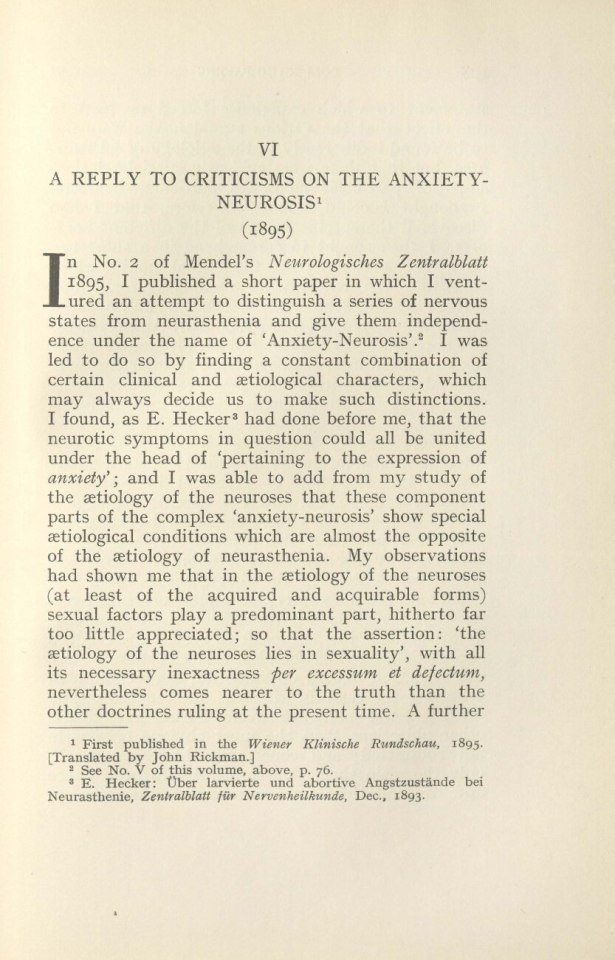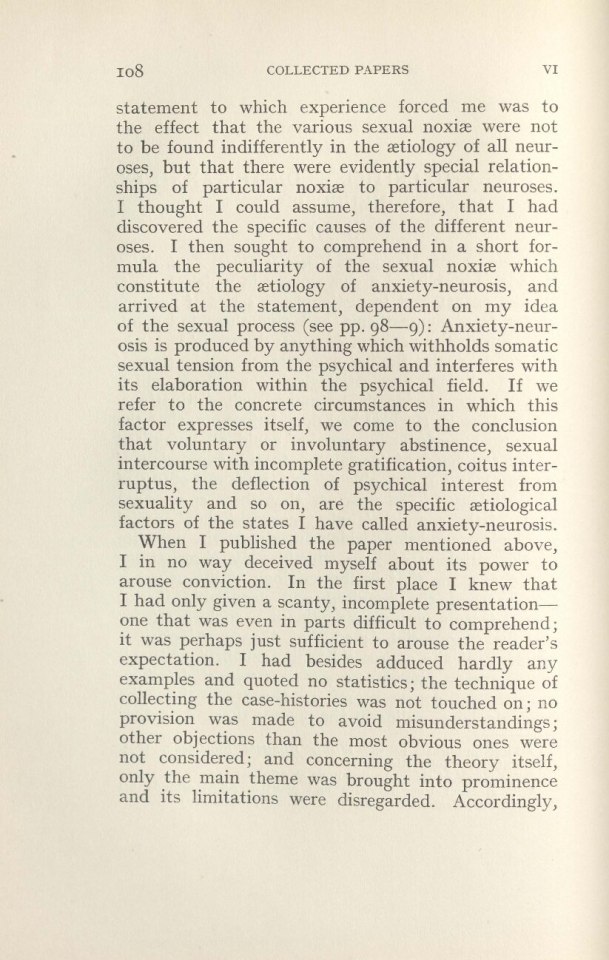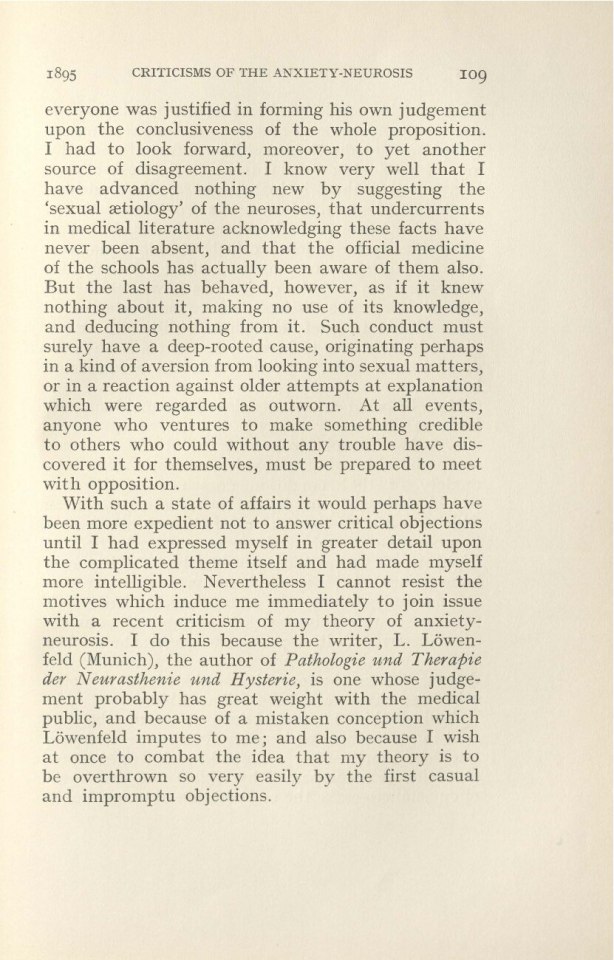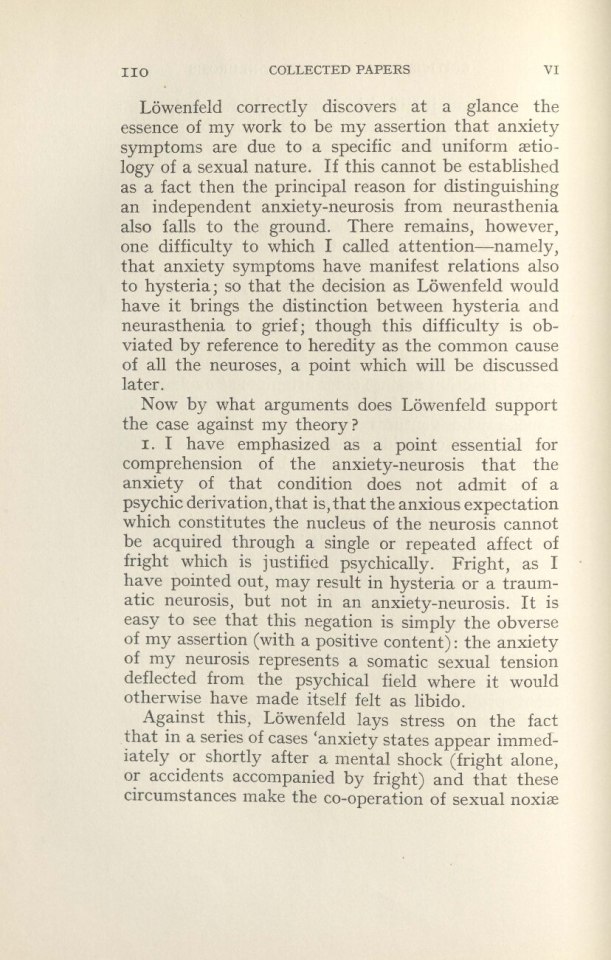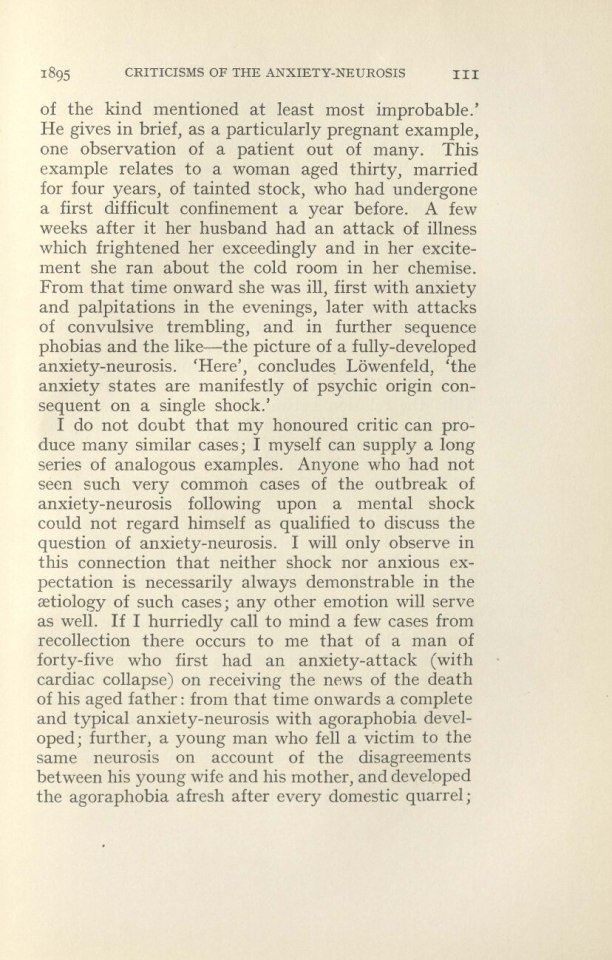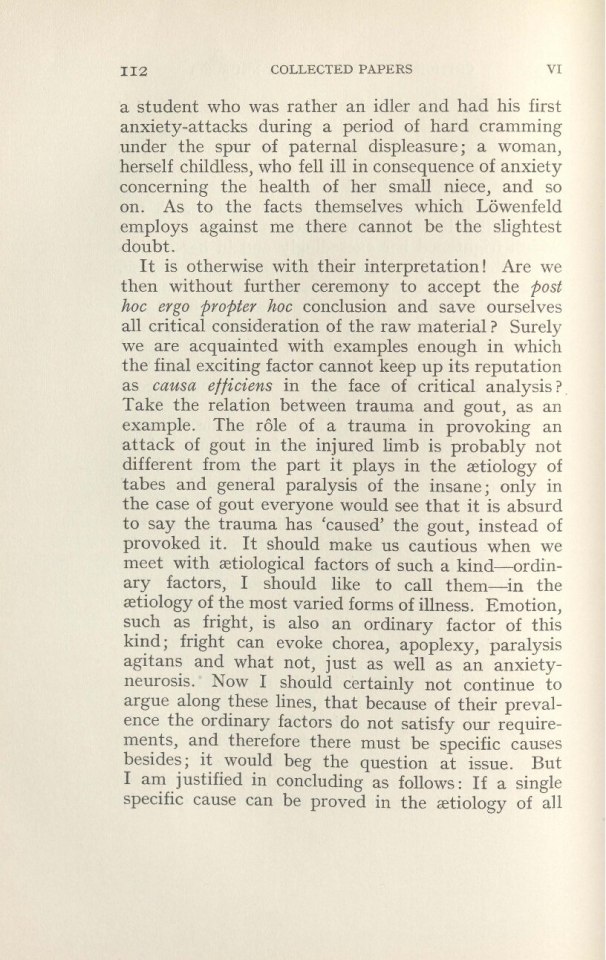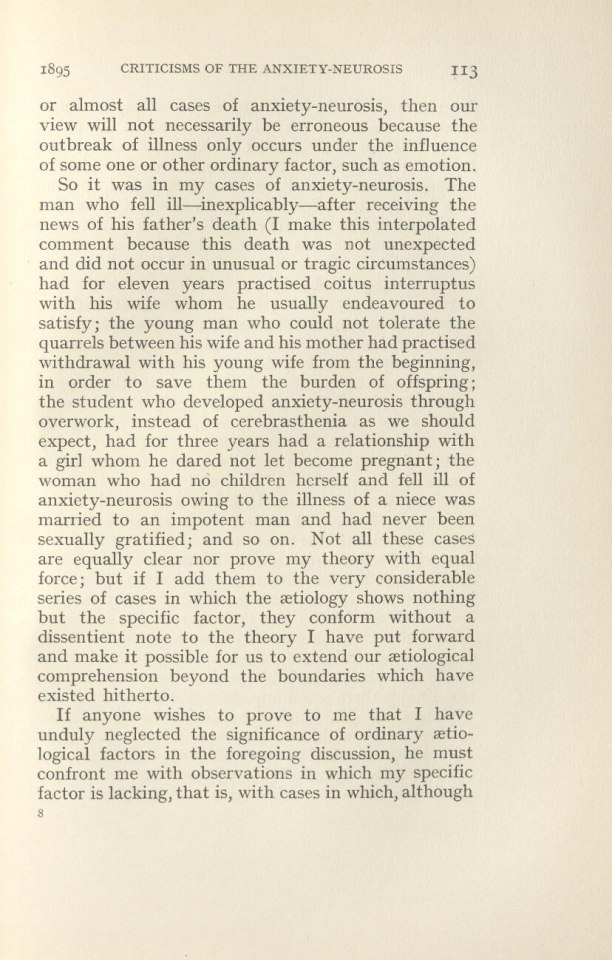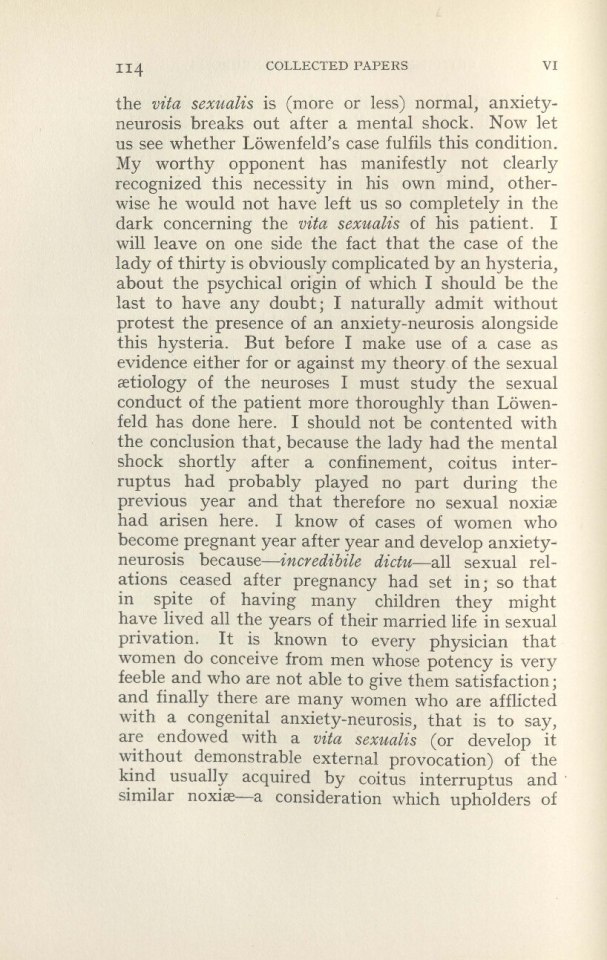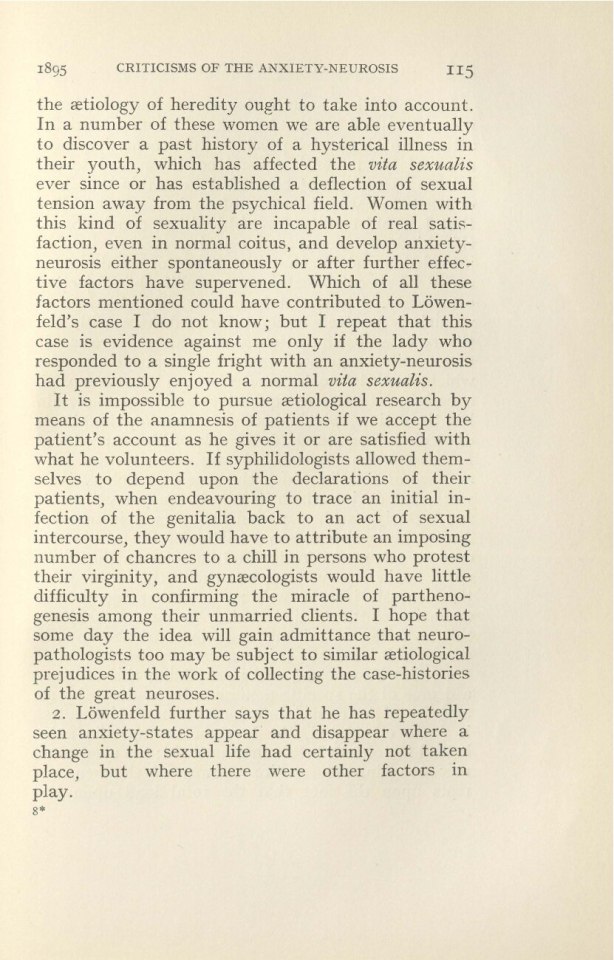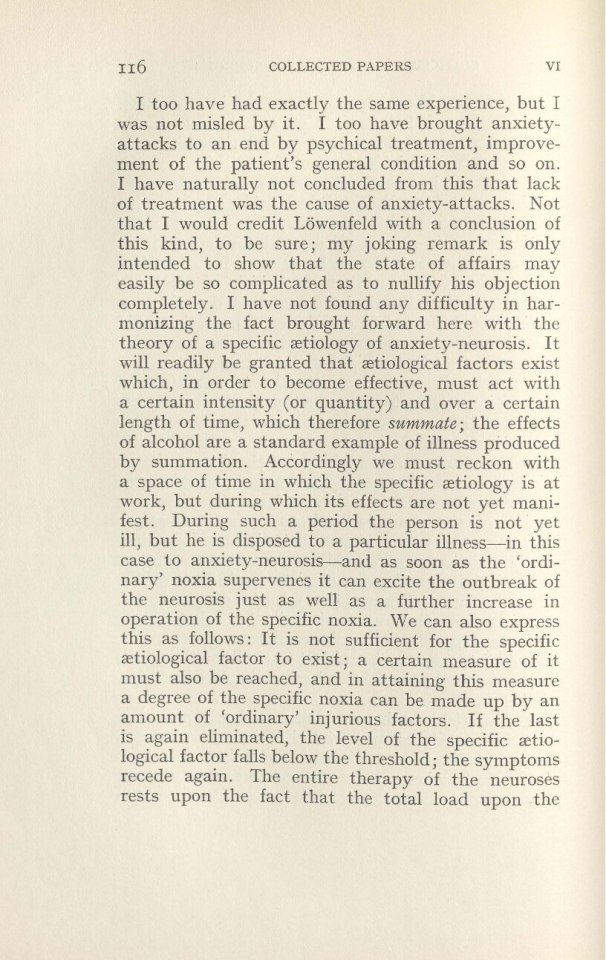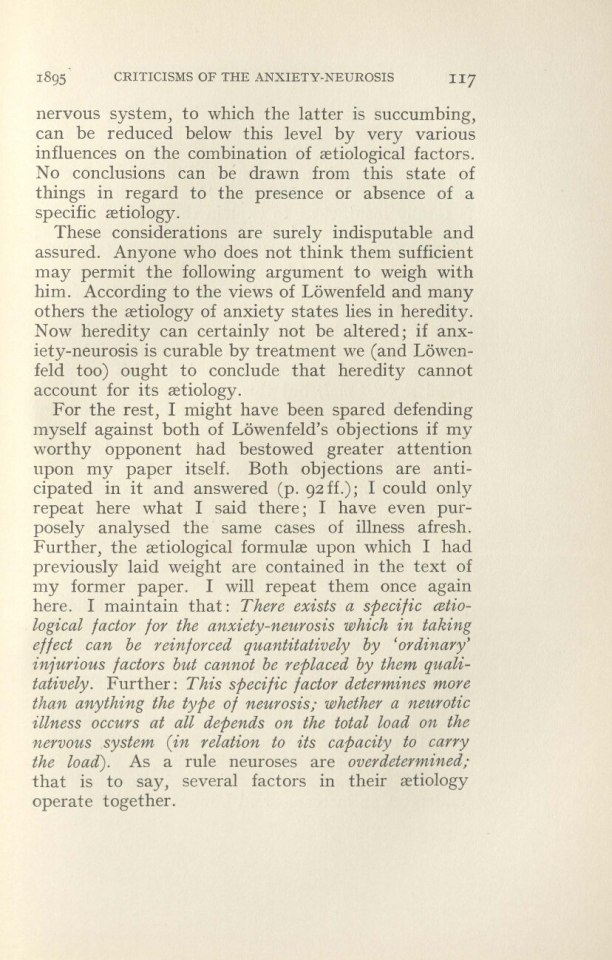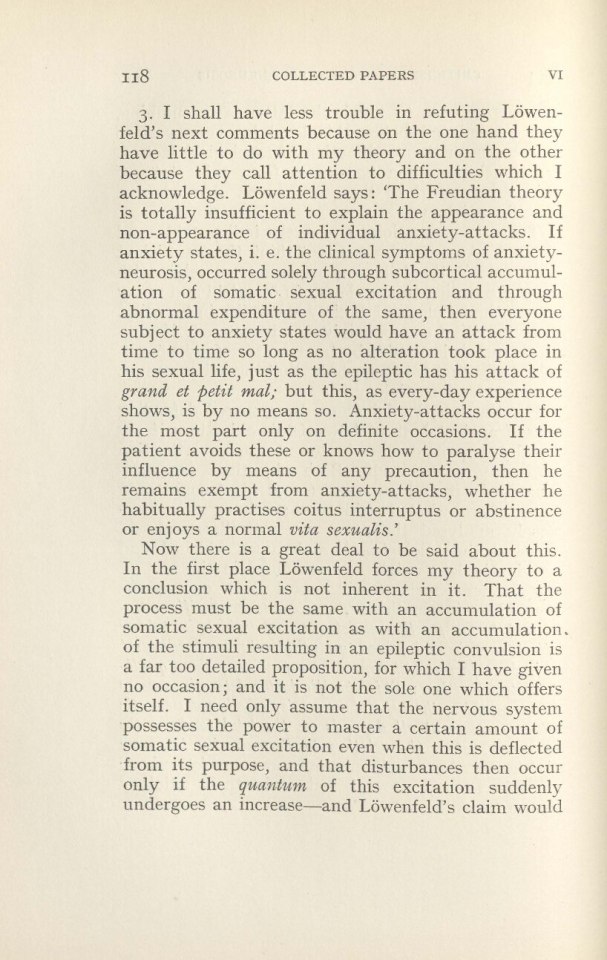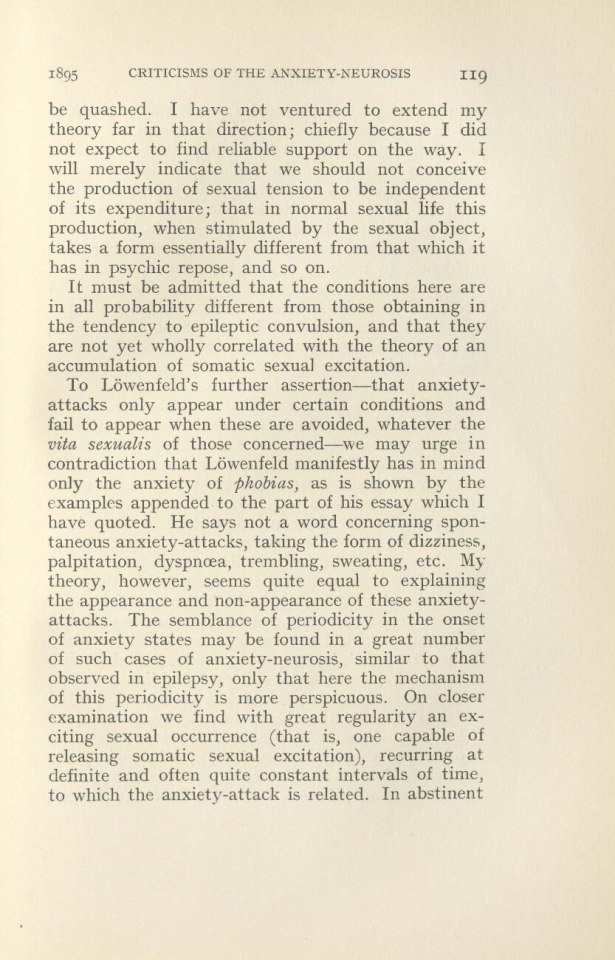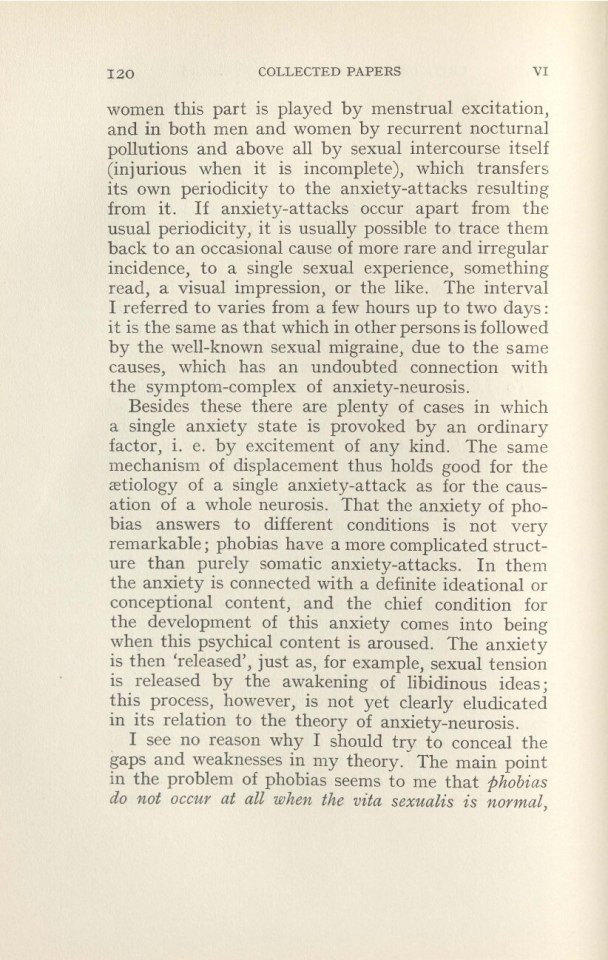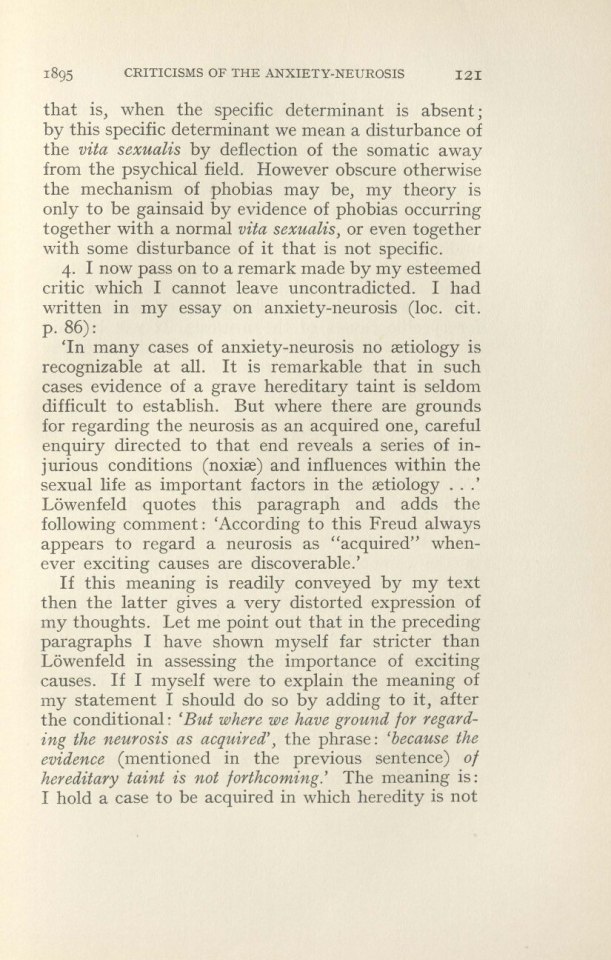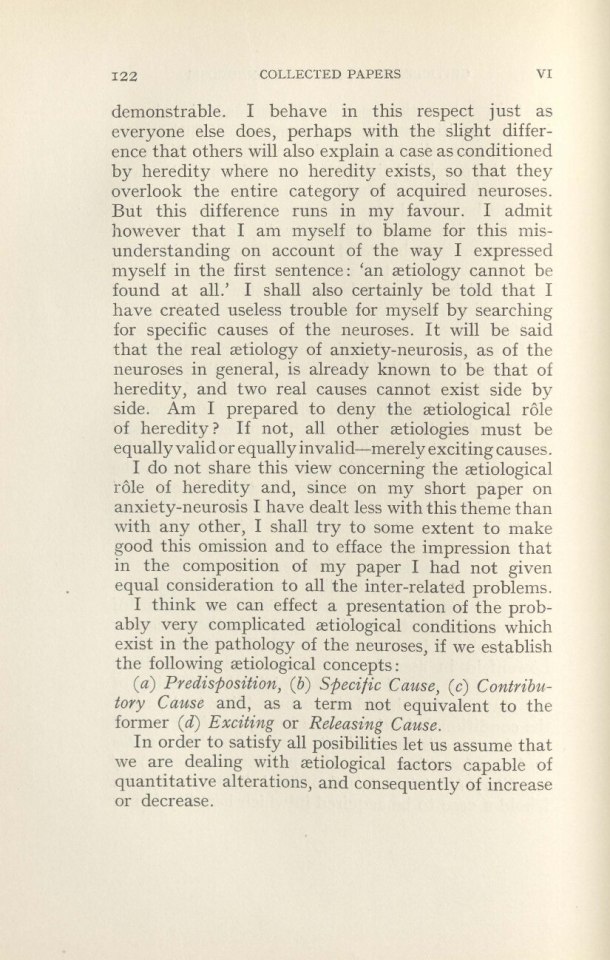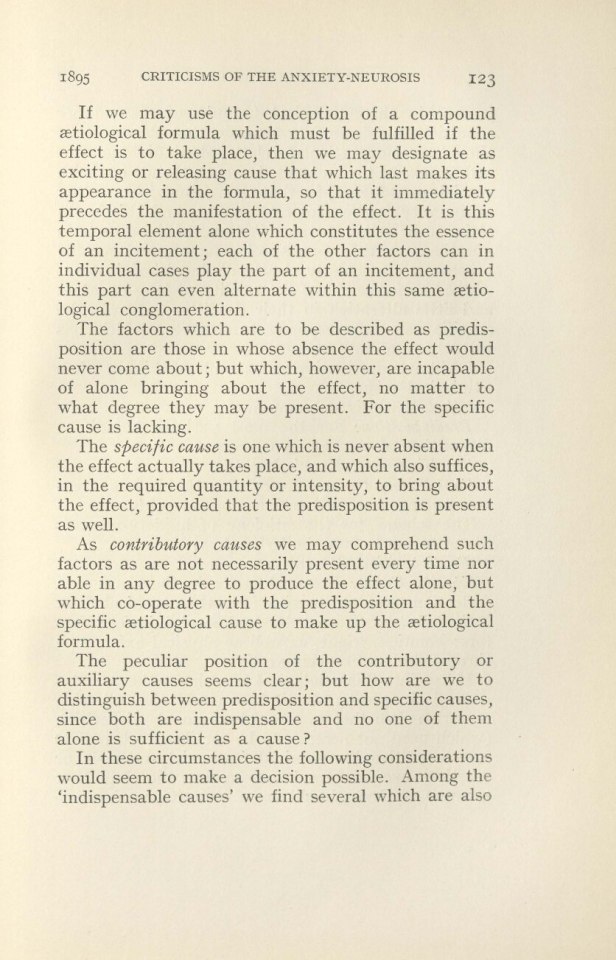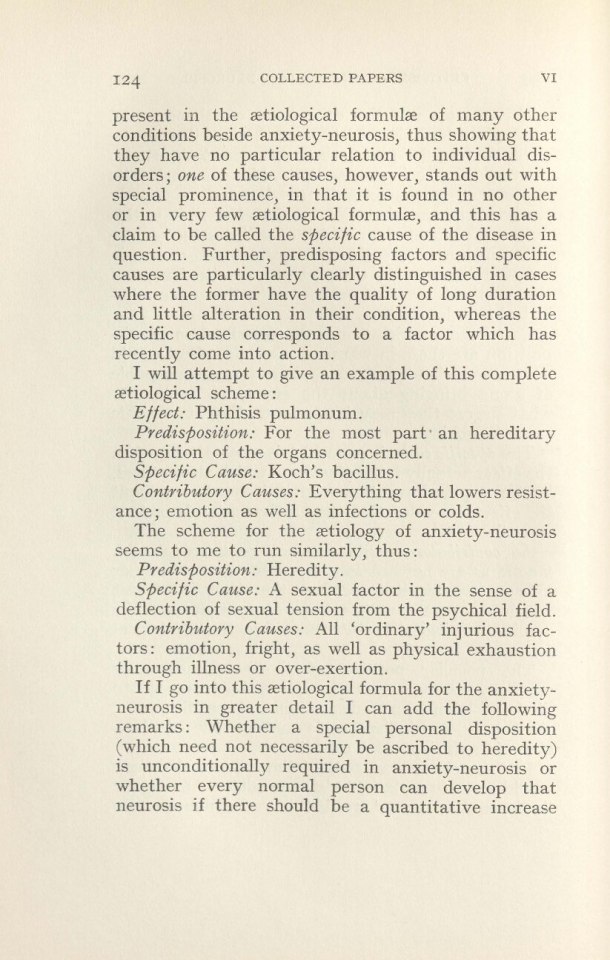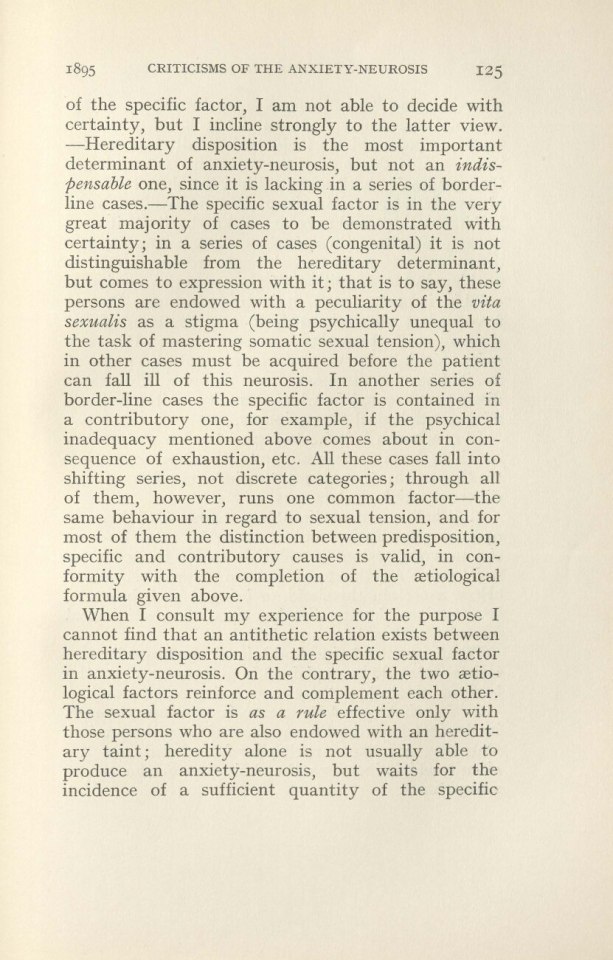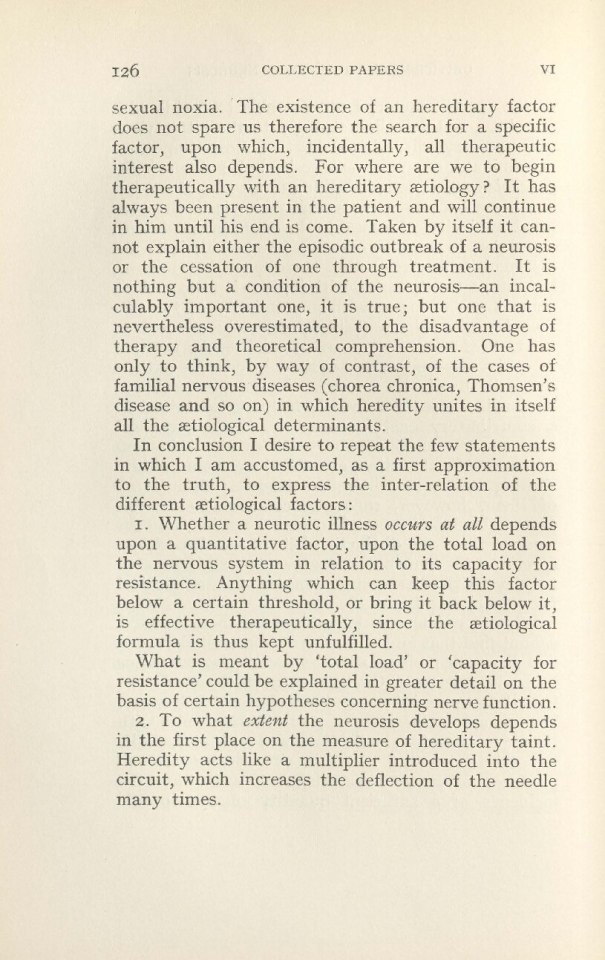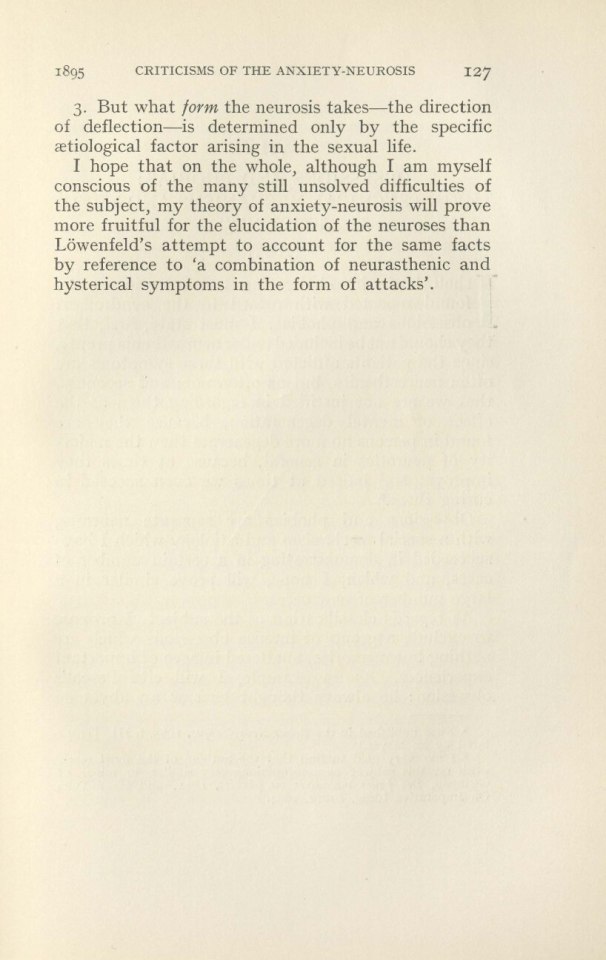S.
A REPLY TO CRITICISMS ON THE ANXIETY-
NEUROSIS!(1895)
n No. 2 of Mendel’s Neurologisches Zentralblatt
1895, I published a short paper in which I vent-
ured an attempt to distinguish a series of nervous
states from neurasthenia and give them independ-
ence under the name of ‘Anxiety-Neurosis’.” I was
led to do so by finding a constant combination of
certain clinical and ztiological characters, which
may always decide us to make such distinctions.
I found, as E. Hecker? had done before me, that the
neurotic symptoms in question could all be united
under the head of ‘pertaining to the expression of
anxiety’,; and I was able to add from my study of
the ztiology of the neuroses that these component
parts of the complex ‘anxiety-neurosis’ show special
ztiological conditions which are almost the opposite
of the ztiology of neurasthenia. My observations
had shown me that in the ztiology of the neuroses
(at least of the acquired and acquirable forms)
sexual factors play a predominant part, hitherto far
too little appreciated; so that the assertion: ‘the
xtiology of the neuroses lies in sexuality’, with all
its necessary inexactness der excessum et defectum,
nevertheless comes nearer to the truth than the
other doctrines ruling at the present time. A further1 First published in the Wiener Klinische Rundschau, 1805.
[Translated by John Rickman.]2 See No. V of this volume, above, p. 76.
® E. Hecker: Über larvierte und abortive Angstzustände bei
Neurasthenie, Zentralblatt für Nervenheilkunde, Dec., 1893.S.
108 COLLECTED PAPERS VI
statement to which experience forced me was to
the effect that the various sexual noxie were not
to be found indifferently in the ztiology of all neur-
oses, but that there were evidently special relation-
ships of particular noxie to particular neuroses.
I thought I could assume, therefore, that I had
discovered the specific causes of the different neur-
oses. I then sought to comprehend in a short for-
mula the peculiarity of the sexual noxie which
constitute the ztiology of anxiety-neurosis, and
arrived at the statement, dependent on my idea
of the sexual process (see pp. 98—9): Anxiety-ncur-
osis is produced by anything which withholds somatic
sexual tension from the psychical and interferes with
its elaboration within the psychical field. If we
refer to the concrete circumstances in which this
factor expresses itself, we come to the conclusion
that voluntary or involuntary abstinence, sexual
intercourse with incomplete gratification, coitus inter-
ruptus, the deflection of psychical interest from
sexuality and so on, are the specific ztiological
factors of the states I have called anxiety-neurosis.When I published the paper mentioned above,
I in no way deceived myself about its power to
arouse conviction. In the first place I knew that
I had only given a scanty, incomplete presentation—
one that was even in parts difficult to comprehend;
it was perhaps just sufficient to arouse the reader’s
expectation. I had besides adduced hardly any
examples and quoted no statistics; the technique of
collecting the case-histories was not touched on; no
provision was made to avoid misunderstandings;
other objections than the most obvious ones were
not considered; and concerning the theory itself,
only the main theme was brought into prominence
and its limitations were disregarded. Accordingly,S.
1805 CRITICISMS OF THE ANXIETY-NEUROSIS 109
everyone was justified in forming his own judgement
upon the conclusiveness of the whole proposition.
I had to look forward, moreover, to yet another
source of disagreement. I know very well that I
have advanced nothing new by suggesting the
‘sexual tiology’ of the neuroses, that undercurrents
in medical literature acknowledging these facts have
never been absent, and that the official medicine
of the schools has actually been aware of them also.
But the last has behaved, however, as if it knew
nothing about it, making no use of its knowledge,
and deducing nothing from it. Such conduct must
surely have a deep-rooted cause, originating perhaps
in a kind of aversion from looking into sexual matters,
or in a reaction against older attempts at explanation
which were regarded as outworn. At all events,
anyone who ventures to make something credible
to others who could without any trouble have dis-
covered it for themselves, must be prepared to meet
with opposition.With such a state of affairs it would perhaps have
been more expedient not to answer critical objections
until I had expressed myself in greater detail upon
the complicated theme itself and had made myself
more intelligible. Nevertheless I cannot resist the
motives which induce me immediately to join issue
with a recent criticism of my theory of anxiety-
neurosis. I do this because the writer, L. Löwen-
feld (Munich), the author of Pathologie und Therapie
der Neurasthenie und Hysterie, is one whose judge-
ment probably has great weight with the medical
public, and because of a mistaken conception which
Löwenfeld imputes to me; and also because I wish
at once to combat the idea that my theory is to
be overthrown so very easily by the first casual
and impromptu objections.S.
IIo COLLECTED PAPERS vI
Löwenfeld correctly discovers at a glance the
essence of my work to be my assertion that anxiety
symptoms are due to a specific and uniform ztio-
logy of a sexual nature. If this cannot be established
as a fact then the principal reason for distinguishing
an independent anxiety-neurosis from neurasthenia
also falls to the ground. There remains, however,
one difficulty to which I called attention—namely,
that anxiety symptoms have manifest relations also
to hysteria; so that the decision as Löwenfeld would
have it brings the distinction between hysteria and
neurasthenia to grief; though this difficulty is ob-
viated by reference to heredity as the common cause
of all the neuroses, a point which will be discussed
later.Now by what arguments does Löwenfeld support
the case against my theory?I. I have emphasized as a point essential for
comprehension of the anxiety-neurosis that the
anxiety of that condition does not admit of a
psychic derivation, that is,that the anxious expectation
which constitutes the nucleus of the neurosis cannot
be acquired through a single or repeated affect of
fright which is justified psychically. Fright, as I
have pointed out, may result in hysteria or a traum-
atic neurosis, but not in an anxiety-neurosis. It is
easy to see that this negation is simply the obverse
of my assertion (with a positive content): the anxiety
of my neurosis represents a somatic sexual tension
deflected from the psychical field where it would
otherwise have made itself felt as libido.Against this, Löwenfeld lays stress on the fact
that in a series of cases ‘anxiety states appear immed-
iately or shortly after a mental shock (fright alone,
or accidents accompanied by fright) and that these
eircumstances make the co-operation of sexual noxisS.
1895 CRITICISMS OF THE ANXIETY-NEUROSIS III
of the kind mentioned at least most improbable.’
He gives in brief, as a particularly pregnant example,
one observation of a patient out of many. This
example relates to a woman aged thirty, married
for four years, of tainted stock, who had undergone
a first difficult confinement a year before. A few
weeks after it her husband had an attack of illness
which frightened her exceedingly and in her excite-
ment she ran about the cold room in her chemise.
From that time onward she was ill, first with anxiety
and palpitations in the evenings, later with attacks
of convulsive trembling, and in further sequence
phobias and the like—the picture of a fully-developed
anxiety-neurosis. ‘Here’, concludes Löwenfeld, “the
anxiety states are manifestly of psychic origin con-
sequent on a single shock.’I do not doubt that my honoured critic can pro-
duce many similar cases; I myself can supply a long
series of analogous examples. Anyone who had not
seen such very common cases of the outbreak of
anxiety-neurosis following upon a mental shock
could not regard himself as qualified to discuss the
question of anxiety-neurosis. I will only observe in
this connection that neither shock nor anxious ex-
pectation is necessarily always demonstrable in the
stiology of such cases; any other emotion will serve
as well. If I hurriedly call to mind a few cases from
recollection there occurs to me that of a man of
forty-five who first had an anxiety-attack (with
cardiac collapse) on receiving the news of the death
of his aged father: from that time onwards a complete
and typical anxiety-neurosis with agoraphobia devel-
oped; further, a young man who fell a victim to the
same neurosis on account of the disagreements
between his young wife and his mother, and developed
the agoraphobia afresh after every domestic quarrel;S.
II2 COLLECIED PAPERS vi
a student who was rather an idler and had his first
anxiety-attacks during a period of hard cramming
under the spur of paternal displeasure; a woman,
herself childless, who fell ill in consequence of anxiety
concerning the health of her small niece, and so
on. As to the facts themselves which Löwenfeld
employs against me there cannot be the slightest
doubt.It is otherwise with their interpretation! Are we
then without further ceremony to accept the post
hoc ergo propter hoc conclusion and save ourselves
all critical consideration of the raw material? Surely
we are acquainted with examples enough in which
the final exciting factor cannot keep up its reputation
as causa efficiens in the face of critical analysis?
Take the relation between trauma and gout, as an
example. The röle of a trauma in provoking an
attack of gout in the injured limb is probably not
different from the part it plays in the »tiology of
tabes and general paralysis of the insane; only in
the case of gout everyone would see that it is absurd
to say the trauma has ‘caused’ the gout, instead of
provoked it. It should make us cautious when we
meet with stiological factors of such a kind—ordin-
ary factors, I should like to call them—in the
tiology of the most varied forms of illness. Emotion,
such as fright, is also an ordinary factor of this
kind; fright can evoke chorea, apoplexy, paralysis
agitans and what not, just as well as an anxiety-
neurosis.. Now I should certainly not continue to
argue along these lines, that because of their preval-
ence the ordinary factors do not satisfy our require-
ments, and therefore there must be specific causes
besides; it would beg the question at issue. But
I am justified in concluding as follows: If a single
specific cause can be proved in the ztiology of allS.
1895 CRITICISMS OF THE ANXIETY-NEUROSIS 113
or almost all cases of anxiety-neurosis, then our
view will not necessarily be erroneous because the
outbreak of illness only occurs under the influence
of some one or other ordinary factor, such as emotion.So it was in my cases of anxiety-neurosis. The
man who fell ill—inexplicably—after receiving the
news of his father’s death (I make this interpolated
comment because this death was not unexpected
and did not occur in unusual or tragic circumstances)
had for eleven years practised coitus interruptus
with his wife whom he usually endeavoured to
satisfy; the young man who could not tolerate the
quarrels between his wife and his mother had practised
withdrawal with his young wife from the beginning,
in order to save them the burden of offspring;
the student who developed anxiety-neurosis through
overwork, instead of cerebrasthenia as we should
expect, had for three years had a relationship with
a girl whom he dared not let become pregnant; the
woman who had no children herself and fell ill of
anxiety-neurosis owing to the illness of a niece was
married to an impotent man and had never been
sexually gratified; and so on. Not all these cases
are equally clear nor prove my theory with equal
force; but if I add them to the very considerable
series of cases in which the ztiology shows nothing
but the specific factor, they conform without a
dissentient note to the theory I have put forward
and make it possible for us to extend our ztiological
comprehension beyond the boundaries which have
existed hitherto.If anyone wishes to prove to me that I have
unduly neglected the significance of ordinary ztio-
logical factors in the foregoing discussion, he must
confront me with observations in which my specific
factor is lacking, that is, with cases in which, although
8S.
II4 COLLECIED PAPERS vi
the vita sexualis is (more or less) normal, anxiety-
neurosis breaks out after a mental shock. Now let
us see whether Löwenfeld’s case fulfils this condition.
My worthy opponent has manifestly not clearly
recognized this necessity in his own mind, other-
wise he would not have left us so completely in the
dark concerning the vita sexualis of his patient. I
will leave on one side the fact that the case of the
lady of thirty is obviously complicated by an hysteria,
about the psychical origin of which I should be the
last to have any doubt; I naturally admit without
protest the presence of an anxiety-neurosis alongside
this hysteria. But before I make use of a case as
evidence either for or against my theory of the sexual
ztiology of the neuroses I must study the sexual
conduct of the patient more thoroughly than Löwen-
feld has done here. I should not be contented with
the conclusion that, because the lady had the mental
shock shortly after a confinement, coitus inter-
ruptus had probably played no part during the
previous year and that therefore no sexual noxiz
had arisen here. I know of cases of women who
become pregnant year after year and develop anxiety-
neurosis because—incredibile dictu—all sexual rel-
ations ceased after pregnancy had set in; so that
in spite of having many children they might
have lived all the years of their married life in sexual
privation. It is known to every physician that
women do conceive from men whose potency is very
feeble and who are not able to give them satisfaction;
and finally there are many women who are afflicted
with a congenital anxiety-neurosis, that is to say,
are endowed with a vila sexualis (or develop it
without demonstrable external provocation) of the
kind usually acquired by coitus interruptus and
similar noxie—a consideration which upholders ofS.
1895 CRITICISMS OF THE ANXIETY-NEUROSIS II5
the ztiology of heredity ought to take into account.
In a number of these women we are able eventually
to discover a past history of a hysterical illness in
their youth, which has affected the vita sexualis
ever since or has established a deflection of sexual
tension away from the psychical field. Women with
this kind of sexuality are incapable of real satis-
faction, even in normal coitus, and develop anxiety-
neurosis either spontaneously or after further effec-
tive factors have supervened. Which of all these
factors mentioned could have contributed to Löwen-
feld’s case I do not know; but I repeat that this
case is evidence against me only if the lady who
responded to a single fright with an anxiety-neurosis
had previously enjoyed a normal vita sexualis.It is impossible to pursue ztiological research by
means of the anamnesis of patients if we accept the
patient’s account as he gives it or are satisfied with
what he volunteers. If syphilidologists allowed them-
selves to depend upon the declarations of their
patients, when endeavouring to trace an initial in-
fection of the genitalia back to an act of sexual
intercourse, they would have to attribute an imposing
number of chancres to a chill in persons who protest
their virginity, and gynscologists would have little
diffieulty in confirming the miracle of partheno-
genesis among their unmarried clients. I hope that
some day the idea will gain admittance that neuro-
pathologists too may be subject to similar etiological
prejudices in the work of collecting the case-histories
of the great neuroses.2. Löwenfeld further says that he has repeatedly
seen anxiety-states appear and disappear where a
change in the sexual life had certainly not taken
place, but where there were other factors inplay.
g*S.
116 COLLECTED PAPERS VI
I too have had exactly the same experience, but I
was not misled by it. I too have brought anxiety-
attacks to an end by psychical treatment, improve-
ment of the patient’s general condition and so on.
I have naturally not concluded from this that lack
of treatment was the cause of anxiety-attacks. Not
that I would credit Löwenfeld with a conclusion of
this kind, to be sure; my joking remark is only
intended to show that the state of affairs may
easily be so complicated as to nullify his objection
completely. I have not found any difficulty in har-
monizing the fact brought forward here with the
theory of a specific ztiology of anxiety-neurosis. It
will readily be granted that ztiological factors exist
which, in order to become effective, must act with
a certain intensity (or quantity) and over a certain
length of time, which therefore summate; the effects
of alcohol are a standard example of illness produced
by summation. Accordingly we must reckon with
a space of time in which the specific ztiology is at
work, but during which its effects are not yet mani-
fest. During such a period the person is not yet
ill, but he is disposed to a particular illness—in this
case {o anxiety-neurosis—and as soon as the ‘ordi-
nary’ noxia supervenes it can excite the outbreak of
the neurosis just as well as a further increase in
operation of the specific noxia. We can also express
this as follows: It is not sufficient for the specific
ztiological factor to exist; a certain measure of it
must also be reached, and in attaining this measure
a degree of the specific noxia can be made up by an
amount of ‘ordinary’ injurious factors. If the last
is again eliminated, the level of the specific atio-
logical factor falls below the threshold; the symptoms
recede again. The entire therapy of the neuroses
rests upon the fact that the total load upon theS.
1895 CRITICISMS OF THE ANXIETY-NEUROSIS 117
nervous system, to which the latter is succumbing,
can be reduced below this level by very various
influences on the combination of ztiological factors.
No conclusions can be drawn from this state of
things in regard to the presence or absence of a
specific ztiology.These considerations are surely indisputable and
assured. Anyone who does not think them sufficient
may permit the following argument to weigh with
him. According to the views of Löwenfeld and many
others the ztiology of anxiety states lies in heredity.
Now heredity can certainly not be altered; if anx-
iety-neurosis is curable by treatment we (and Löwen-
feld too) ought to conclude that heredity cannot
account for its »tiology.For the rest, I might have been spared defending
myself against both of Löwenfeld’s objections if my
worthy opponent had bestowed greater attention
upon my paper itself. Both objections are anti-
cipated in it and answered (p. g2ff.); I could only
repeat here what I said there; I have even pur-
posely analysed the same cases of illness afresh.
Further, the ztiological formule upon which I had
previously laid weight are contained in the text of
my former paper. I will repeat them once again
here. I maintain that: T’here exists a specific etio-
logical factor for the anxiety-neurosis which in taking
effect can be veinforced quantitatively by ‘ordinary’
injurious factors but cannot be replaced by them quali-
tatively. Further: This specific factor determines more
than anything the type of neurosis,; whether a neurolic
illness occurs at all depends on the total load on the
nervous system (in relation to üs capacity to carry
the load). As a rule neuroses are overdetermined;
that is to say, several factors in their atiology
operate together.S.
IId COLLECTED PAPERS VI
3. I shall have less trouble in refuting Löwen-
feld’s next comments because on the one hand they
have little to do with my theory and on the other
because they call attention to difficulties which I
acknowledge. Löwenfeld says: ‘The Freudian theory
is totally insufficient to explain the appearance and
non-appearance of individual anxiety-attacks. If
anxiety states, i. e. the clinical symptoms of anxiety-
neurosis, occurred solely through subcortical accumul-
ation of somatic. sexual excitation and through
abnormal expenditure of the same, then everyone
subject to anxiety states would have an attack from
time to time so long as no alteration took place in
his sexual life, just as the epileptic has his attack of
grand et petit mal; but this, as every-day experience
shows, is by no means so. Anxiety-attacks occur for
the most part only on definite occasions. If the
patient avoids these or knows how to paralyse their
influence by means of any precaution, then he
remains exempt from anxiety-attacks, whether he
habitually practises coitus interruptus or abstinence
or enjoys a normal vita sexualis.Now there is a great deal to be said about this.
In the first place Löwenfeld forces my theory to a
conclusion which is not inherent in it. That the
process must be the same with an accumulation of
somatic sexual excitation as with an accumulation.
of the stimuli resulting in an epileptic convulsion is
a far too detailed proposition, for which I have given
no occasion; and it is not the sole one which offers
itself. I need only assume that the nervous system
possesses the power to master a certain amount of
somatic sexual excitation even when this is deflected
from its purpose, and that disturbances then occur
only if the quantum of this excitation suddenly
undergoes an increase—and Löwenfeld’s claim wouldS.
1895 CRITICISMS OF THE ANXIETY-NEUROSIS IIQ
be quashed. I have not ventured to extend my
theory far in that direction; chiefly because I did
not expect to find reliable support on the way. I
will merely indicate that we should not conceive
the production of sexual tension to be independent
of its expenditure; that in normal sexual life this
production, when stimulated by the sexual object,
takes a form essentially different from that which it
has in psychie repose, and so on.It must be admitted that the conditions here are
in all probability different from those obtaining in
the tendency to epileptic convulsion, and that they
are not yet wholly correlated with the theory of an
accumulation of somatic sexual excitation.To Löwenfeld’s further assertion—that anxiety-
attacks only appear under certain conditions and
fail to appear when these are avoided, whatever the
vita sexualis of those concerned—we may urge in
contradiction that Löwenfeld manifestly has in mind
only the anxiety of phobias, as is shown by the
examples appended to the part of his essay which I
have quoted. He says not a word concerning spon-
taneous anxiety-attacks, taking the form of dizziness,
palpitation, dyspnea, trembling, sweating, etc. My
theory, however, seems quite equal to explaining
the appearance and non-appearance of these anxiety-
attacks. The semblance of periodicity in the onset
of anxiety states may be found in a great number
of such cases of anxiety-neurosis, similar to that
observed in epilepsy, only that here the mechanism
of this periodicity is more perspicuous. On closer
examination we find with great regularity an ex-
citing sexual occurrence (that is, one capable of
releasing somatic sexual excitation), recurring at
definite and often quite constant intervals of time,
to which the anxiety-attack is related. In abstinentS.
I20 COLLECTED PAPERS vi
women this part is played by menstrual excitation,
and in both men and women by recurrent nocturnal
pollutions and above all by sexual intercourse itself
(injurious when it is incomplete), which transfers
its own periodicity to the anxiety-attacks resulting
irom it. If anxiety-attacks occur apart from the
usual periodicity, it is usually possible to trace them
back to an occasional cause of more rare and irregular
incidence, to a single sexual experience, something
read, a visual impression, or the like. The interval
I referred to varies from a few hours up to two days:
it is the same as that which in other persons is followed
by the well-known sexual migraine, due to the same
causes, which has an undoubted connection with
the symptom-complex of anxiety-neurosis.Besides these there are plenty of cases in which
a single anxiety state is provoked by an ordinary
factor, i. e. by excitement of any kind. The same
mechanism of displacement thus holds good for the
xtiology of a single anxiety-attack as for the caus-
ation of a whole neurosis. That the anxiety of pho-
bias answers to different conditions is not very
remarkable; phobias have a more complicated struct-
ure than purely somatic anxiety-attacks. In them
the anxiety is connected with a definite ideational or
conceptional content, and the chief condition for
the development of this anxiety comes into being
when this psychical content is aroused. The anxiety
is then ‘released’, just as, for example, sexual tension
is released by the awakening of libidinous ideas;
this process, however, is not yet clearly eludicated
in its relation to the theory of anxiety-neurosis.I see no reason why I should try to conceal the
gaps and weaknesses in my theory. The main point
in the problem of phobias seems to me that phobias
do not occur at all when the vita sexualis is normal,S.
1895 CRITICISMS OF THE ANXIETY-NEUROSIS 121
that is, when the specific determinant is absent;
by this specific determinant we mean a disturbance of
the vita sexualis by deflection of the somatic away
from the psychical field. However obscure otherwise
the mechanism of phobias may be, my theory is
only to be gainsaid by evidence of phobias occurring
together with a normal vita sexuahis, or even together
with some disturbance of it that is not specific.4. Inow pass on to a remark made by my esteemed
eritic which I cannot leave uncontradicted. I had
written in my essay on anxiety-neurosis (loc. cit.. 86):
ö ‘In many cases of anxiety-neurosis no ztiology is
recognizable at all. It is remarkable that in such
cases evidence of a grave hereditary taint is seldom
difficult to establish. But where there are grounds
for regarding the neurosis as an acquired one, careful
enquiry directed to that end reveals a series of in-
jurious conditions (noxie) and influences within the
sexual life as important factors in the ztiology .. .’
Löwenfeld quotes this paragraph and adds the
following comment: ‘According to this Freud always
appears to regard a neurosis as “acquired” when-
ever exciting causes are discoverable.’If this meaning is readily conveyed by my text
then the latter gives a very distorted expression of
my thoughts. Let me point out that in the preceding
paragraphs I have shown myself far stricter than
Löwenfeld in assessing the importance of exciting
causes. If I myself were to explain the meaning of
my statement I should do so by adding to it, after
the conditional: ‘But where we have ground for regard-
ing the neurosis as acquired’, the phrase: “because the
evidence (mentioned in the previous sentence) of
hereditary taint is not forthcoming.’ The meaning is:
I hold a case to be acquired in which heredity is notS.
122 COLLECIED PAPERS YA
demonstrable. I behave in this respect just as
everyone else does, perhaps with the slight differ-
ence that others will also explain a case as conditioned
by heredity where no heredity exists, so that they
overlook the entire category of acquired neuroses.
But this difference runs in my favour. I admit
however that I am myself to blame for this mis-
understanding on account of the way I expressed
myself in the first sentence: ‘an ztiology cannot be
found at all.’ I shall also certainly be told that I
have created useless trouble for myself by searching
for specific causes of the neuroses. It will be said
that the real tiology of anxiety-neurosis, as of the
neuroses in general, is already known to be that of
heredity, and two real causes cannot exist side by
side. Am I prepared to deny the ztiological röle
of heredity? If not, all other z»tiologies must be
equally validorequallyinvalid—-merely exciting causes.I do not share this view concerning the tiological
röle of heredity and, since on my short paper on
anxiety-neurosis I have dealt less with this theme than
with any other, I shall try to some extent to make
good this omission and to efface the impression that
in the composition of my paper I had not given
equal consideration to all the inter-related problems.I think we can effect a presentation of the prob-
ably very complicated ztiological conditions which
exist in the pathology of the neuroses, if we establish
the following ztiological concepts:(a) Predisposition, (b) Specific Cause, (c) Contribu-
tory Cause and, as a term not equivalent to the
former (d) Exciting or Releasing Cause.In order to satisfy all posibilities let us assume that
we are dealing with ztiological factors capable ofquantitative alterations, and consequently of increase
or decrease.S.
1805 CRITICISMS OF THE ANXIETY-NEUROSIS 123
If we may use the conception of a compound
ztiological formula which must be fulfilled if the
effect is to take place, then we may designate as
exciting or releasing cause that which last makes its
appearance in the formula, so that it immediately
precedes the manifestation of the effect. It is this
temporal element alone which constitutes the essence
of an incitement; each of the other factors can in
individual cases play the part of an incitement, and
this part can even alternate within this same ztio-
logical conglomeration.The factors which are to be described as predis-
position are those in whose absence the effect would
never come about; but which, however, are incapable
of alone bringing about the effect, no matter to
what degree they may be present. For the specific
cause is lacking.The specific cause is one which is never absent when
the effect actually takes place, and which also suffices,
in the required quantity or intensity, to bring about
the effect, provided that the predisposition is present
as well.As contributory causes we may comprehend such
factors as are not necessarily present every time nor
able in any degree to produce the effect alone, but
which co-operate with the predisposition and the
specific »tiological cause to make up the tiological
formula.The peculiar position of the contributory or
auxiliary causes seems clear; but how are we to
distinguish between predisposition and specific causes,
since both are indispensable and no one of them
alone is sufficient as a cause?In these circumstances the following considerations
would seem to make a decision possible. Among the
“indispensable causes’ we find several which are alsoS.
124 COLLECIED PAPERS YA
present in the ztiological formule of many other
conditions beside anxiety-neurosis, thus showing that
they have no particular relation to individual dis-
orders; one of these causes, however, stands out with
special prominence, in that it is found in no other
or in very few ztiological formule, and this has a
claim to be called the specific cause of the disease in
question. Further, predisposing factors and specific
causes are particularly clearly distinguished in cases
where the former have the quality of long duration
and little alteration in their condition, whereas the
specific cause corresponds to a factor which has
recently come into action.I will attempt to give an example of this complete
atiological scheme:Effect: Phthisis pulmonum.
Predisposition: For the most part’ an hereditary
disposition of the organs concerned.Specific Cause: Koch’s bacillus.
Contributory Causes: Everything that lowers resist-
ance; emotion as well as infections or colds.The scheme for the ztiology of anxiety-neurosis
seems to me to run similarly, thus:Predisposition: Heredity.
Specific Cause: A sexual factor in the sense of a
deflection of sexual tension from the psychical field.Contributory Causes: All ‘ordinary’ injurious fac-
tors: emotion, fright, as well as physical exhaustion
through illness or over-exertion.If I go into this stiological formula for the anxiety-
neurosis in greater detail I can add the following
remarks: Whether a special personal disposition
(which need not necessarily be ascribed to heredity)
is unconditionally required in anxiety-neurosis or
whether every normal person can develop that
neurosis if there should be a quantitative increaseS.
1895 CRITICISMS OF THE ANXIETY-NEUROSIS I25
of the specific factor, I am not able to decide with
certainty, but I incline strongly to the latter view.
—Hereditary disposition is the most important
determinant of anxiety-neurosis, but not an indis-
pensable one, since it is lacking in a series of border-
line cases.— The specific sexual factor is in the very
great majority of cases to be demonstrated with
certainty; in a series of cases (congenital) it is not
distinguishable from the hereditary determinant,
but comes to expression with it; that is to say, these
persons are endowed with a peculiarity of the vita
sexualis as a stigma (being psychically unequal to
the task of mastering somatic sexual tension), which
in other cases must be acquired before the patient
can fall ill of this neurosis. In another series of
border-line cases the specific factor is contained in
a contributory one, for example, if the psychical
inadequacy mentioned above comes about in con-
sequence of exhaustion, etc. All these cases fall into
shifting series, not discrete categories; through all
of them, however, runs one common factor—the
same behaviour in regard to sexual tension, and for
most of them the distinction between predisposition,
specific and contributory causes is valid, in con-
formity with the completion of the ztiological
formula given above.When I consult my experience for the purpose I
cannot find that an antithetic relation exists between
hereditary disposition and the specific sexual factor
in anxiety-neurosis. On the contrary, the two atio-
logical factors reinforce and complement each other.
The sexual factor is as a rule effective only with
those persons who are also endowed with an heredit-
ary taint; heredity alone is not usually able to
produce an anxiety-neurosis, but waits for the
incidence of a sufficient quantity of the specificS.
126 COLLECTED PAPERS vI
sexual noxia. The existence of an hereditary factor
does not spare us therefore the search for a specific
factor, upon which, incidentally, all therapeutic
interest also depends. For where are we to begin
therapeutically with an hereditary ztiology? It has
always been present in the patient and will continue
in him until his end is come. Taken by itself it can-
not explain either the episodic outbreak of a neurosis
or the cessation of one through treatment. It is
nothing but a condition of the neurosis—an incal-
culably important one, it is true; but onc that is
nevertheless overestimated, to the disadvantage of
therapy and theoretical comprehension. One has
only to think, by way of contrast, of the cases of
familial nervous diseases (chorea chronica, Thomsen’s
disease and so on) in which heredity unites in itself
all the tiological determinants.In conclusion I desire to repeat the few statements
in which I am accustomed, as a first approximation
to the truth, to express the inter-relation of the
different ztiological factors:I. Whether a neurotic illness occurs at all depends
upon a quantitative factor, upon the total load on
the nervous system in relation to its capacity for
resistance. Anything which can keep this factor
below a certain threshold, or bring it back below it,
is effective therapeutically, since the ztiological
formula is thus kept unfulfilled.What is meant by “total load’ or ‘capacity for
resistance’ could be explained in greater detail on the
basis of certain hypotheses concerning nerve function.2. To what extent the neurosis develops depends
in the first place on the measure of hereditary taint.
Heredity acts like a multiplier introduced into the
circuit, which increases the deflection of the needle
many times.S.
1895 CRITICISMS OF THE ANNIETY-NEUROSIS 127
3. But what /orm the neurosis takes—the direction
of deflection—is determined only by the specific
xtiological factor arising in the sexual life.I hope that on the whole, although I am myself
conscious of the many still unsolved difficulties of
the subject, my theory of anxiety-neurosis will prove
more fruitful for the elucidation of the neuroses than
Löwenfeld’s attempt to account for the same facts
by reference to ‘a combination of neurasthenic and
hysterical symptoms in the form of attacks’. .
freud-1924-cp-1
107
–127
